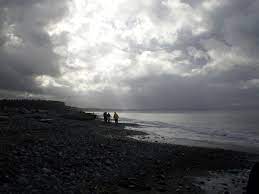By J.M. Grenier
Vern sat on the couch
“Vern, get dressed. We’re going to be late,” Vera said.
“I am dressed,” he said
Vera sighed. She did this when she was exasperated, mainly at her husband, which was often.
“You can’t go to your father’s funeral in shorts.”
“Why not?”
“What do you mean, why not? It’s a funeral. It’s just not done. Put on some pants. We have to go.”
“It’s too hot for pants.”
Vera sighed again and walked out. If Vern wanted to look like he didn’t care, that was his problem.
Vern chuckled. He did that whenever he annoyed Vera enough to get her to leave him alone, which was often.
Ten minutes later they were in the Chevy, Vera was wearing her Sunday best, including a wide-brimmed hat with a bird on it. Vern was spoting a white button-down shirt, black tie, navy sport coat, and golf shorts over sandals.
Off they went.
Vern shifted into third as they got to the two-lane interstate. The truck was silent, other than the hum of the motor and shifting of gears. It had a manual transmission, which Vern liked. Operating a manual was really driving, instead of just going along for the ride, which is what he felt like when he drove an automatic.
Vern’s mind began to wander, as it often did when he drove. He thought about his father, who had wanted him to take over the family autoparts business instead of going to college. Vern chafed at the memory. He had gone anyway and graduated from Wentworth with a degree in Civil Engineering in 1971. After which he pointedly avoided going home, and instead enrolled in the Army Corps of Engineers.
At the time, the Army was winding down one war and not quite ready to start the next, so he spent much of his service reworking plans for barracks and assisting with various civilian projects. Temporary dams were his favorite task, and he earned a reputation for being good at them.
The first Gulf War broke out a year before he was eligible for retirement. The so-called 100 day War was won largely through air power. It seemed as if it were over almost before it had begun. Victory was declared by all the right people. The embedded journalists went back to writing AP feeds in air-conditioned Manhattan high rises, but the oil fields burned pillars of smoke by day, and fire by night, as the West led their own Exodus from the scorched desert.
Vern’s unit was shipped out at that time. He spent the rest of the year involved with the rebuild and refit of the Kuwaiti oil rigs. It was boring work, and he didn’t like the sand or the heat. He did get to see the Euphrates river and assisted with the construction of a temporary pontoon bridge. His suggestion for using the bridge to help direct water to a local village was rejected.
In April of 1992 Vern became eligible for retirement. Having enough of both the heat and Uncle Sam’s Army, he filed the paperwork that very day.
“Vern, slow down!”
Vera’s voice drifted through the sands of memory and into his consciousness.
“Eh?”
“Slow down! The speed limit is forty.”
He checked. Somewhere along the way he had shifted into fifth gear and was doing fifty-two miles an hour. Betsy, as he called his truck, liked that sweet spot to shift into the higher gear. If he shifted before that, say forty-eight or fifty miles per hour, the truck would nag him until he shifted back to fourth, gained speed, and then up to the higher gear.
That was just Betsy. Logically, as a machine, she was easier to deal with than Vera. Machines had rules, but humans didn’t. At least none Vern could fathom. Certainly there was no operator’s manual for dealing with people, and that was enough right there. He had remarked this to Vera several times, to which she would only sigh.
The memorial service was brief. The little out-of-the-way chapel was pleasant enough, though too hot. Vern’s brother Phil said a few words. The minister said more. As his father had been cremated, there was no trip to the cemetery. There was, however, a light lunch in the grove outback under a weathered but serviceable standing tent top.
Vern drank sour lemonade, listened to the condolences of friends and cousins he hadn’t seen in years, and redesigned the tent top’s pully system in his head.
No one said anything about his shorts.
Later that evening, a fast-moving thunderstorm moved up the coast of Maine. It swung inland right over their place before blowing out to sea. The air around the house dropped twelve degrees in twelve minutes. Vern sat in the rocking bench on the front porch the whole time. The cool air was damp and had a slight salt taste that reminded him of their once semi-regular trips to Bar Harbor, that he still liked after all these years.
It had been a long time since they had driven down the coast together. Vern wondered why that was.
At 9:17 p.m., Vera came out with two tall glasses of lemonade with ice. She handed one to Vern and sat next to him.
“Thank you,” he said. Then he scratched his calf where a black fly had bitten him.
“That doesn’t look good,” Vera said.
“My own fault,” Vern said, “but it was too hot for pants. Anyway, I’ll live.”
“I hope so.”
Vern sipped the lemonade. It was cold and delicious. “I don’t see why,” he said. “I’m a jerk.”
“No, you’re not, you’re hurting.”
“No excuse. My dad was a jerk. I’m just like him.”
Vera touched Vern’s hand, the way they had when they were young. He noticed the varicose veins in the backs of both their hands. Hers were beautiful, like the slender lines of a long river in the desert. His just looked like knotty bulges.
“I’m old, I’m ugly, and I’m a jerk,” he said.
“I told you, you’re not a jerk.
“Okay. Old and ugly is it it is.”
“Oh, stop,” she said. “You and Stanley had a complicated relationship.”
Vern snorted. “To say the least.”
“But he loved you.”
“He had a funny way of showing it.”
“He didn’t know how.”
Vern grunted.
“And neither did you. It doesn’t mean you don’t love him and miss him. You just have to take some time to sort it all out.”
“I don’t know how to do that either,” Vern admitted.
“That’s because there’s no operator’s manual for this,” Vera said.
They sat together for a while, holding hands. The crickets sang out the notes of their final summer song, and far off over the sea, the storm rumbled out the last of its fury in long, winding echoes.








